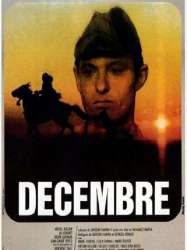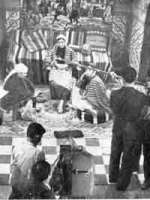Mohammed Lakhdar-Hamina is a Actor, Director, Scriptwriter, Producer, Camera Operator and Cinematography Algérien born on 26 february 1934 at M'Sila (Algerie)

Mohammed Lakhdar-Hamina (Arabic: محمد الأخضر حمينة; born in M'sila in 26 February 1934) is an Algerian film director. He is best known for his 1975 film Chronicle of the Years of Embers. He is one of the most prominent figures in contemporary Arabic cinema.
which he was director from 1963 until its dissolution in 1974. From 1981 until 1984 he acted as director of the Office National pour le Commerce et l’Industrie Cinématographique.
Source : Wikidata
Mohammed Lakhdar-Hamina

Birth name Mohammed Lakhdar-Hamina
Nationality Algerie
Birth 26 february 1934 (90 years) at M'Sila (Algerie)
Nationality Algerie
Birth 26 february 1934 (90 years) at M'Sila (Algerie)
Biography
Born on 26 February 1934 at M’Sila, Algeria, Lakhdar began his studies in his native country. He first became interested in the world of cinema at the Lycée Carnot in Cannes, France. After beginning studies of agriculture and law at French universities, he deserted the French army in 1958 and joined the anti-French Algerian resistance in Tunisia, where he worked for the provisional Algerian government in exile. His film career began as he joined the Algerian Maquis (guerrillas). In 1959, the Algerian National Liberation Front (FLN) sent him to Prague, where he pursued his cinematography studies at the cinema school, Film and TV School of the Academy of Performing Arts in Prague, the Czech academy for cinema and television. However, he quit his studies in order to work for the Barrandov Studios. In 1960 he joined the Service Cinema, created by the Algerian government in exile. In 1959, the Algerian ministry of information in exile commissioned Lakhdar-Hamina, together with Djamel Chanderli and Pierre Chaulet, to produce a movie about Algeria’s predicament under French colonialism. The documentary film, titled Djazzaïrouna (Our Algeria), aimed at portraying the goals pursued by the Algerian nationalist guerrilla movement, the Maquis. In 1961, Lakhdar-Hamina collaborated with Chanderli in the movie Yasmina, which tells the story of a refugee girl who must flee her village following its destruction. Lakhdar-Hamina collaborated again with Chanderli in the 1962 The people’s voice and 1961 The guns of freedom. Upon Algerian independence in 1962, he returned to his homeland where, together with his colleagues from Tunisian exile, he founded the Office des actualités algériennes, ofwhich he was director from 1963 until its dissolution in 1974. From 1981 until 1984 he acted as director of the Office National pour le Commerce et l’Industrie Cinématographique.
Usually with
Filmography of Mohammed Lakhdar-Hamina (13 films)
Actor

An Officer and a Spy (2019)
, 2h12Directed by Roman Polanski
Origin France
Genres Drama, Thriller, Historical
Themes Politique, Political films
Actors Jean Dujardin, Louis Garrel, Emmanuelle Seigner, Grégory Gadebois, Hervé Pierre, Vladimir Yordanoff
Roles Bachir
Rating71%





En 1894, le capitaine Alfred Dreyfus, officier français de confession juive, est condamné à la déportation à vie pour avoir fourni des documents secrets à l'Allemagne. Le commandant Marie-Georges Picquart, promu lieutenant-colonel et chef du Deuxième Bureau, découvre que le commandant Ferdinand Walsin Esterhazy espionne pour l'Allemagne et que son propre adjoint, Hubert Henry, sait que le véritable traître n'est pas Dreyfus mais Esterhazy, surnommé Dubois. Par devoir et sens de l'honneur, Picquart refuse d'obéir à ses chefs qui lui ordonnent d'étouffer l'affaire. Il est menacé, arrêté, emprisonné, mais persiste jusqu'à ce que la vérité éclate et que Dreyfus soit libéré et réhabilité. Pendant douze ans, cette « affaire » déchire la France de la Troisième République et fait scandale dans le monde entier.

Last Image (1986)
, 3h15Directed by Mohammed Lakhdar-Hamina
Origin Algerie
Genres Drama, Comedy
Actors Véronique Jannot, Michel Boujenah, Jean Bouise, Jean-François Balmer, Hassan El-Hassani, Geneviève Mnich
Roles Oncle Amar
Rating50%





Peu avant la Seconde Guerre mondiale, dans un village algérien, une institutrice fraîchement arrivée de la métropole, mademoiselle Claire Boyer, faire naître les passions. Prenant le parti des Algériens, elle révulse les colons. Un de ses jeunes élèves, Mouloud, tombe amoureux d'elle.
 , 2h57
, 2h57Directed by Mohammed Lakhdar-Hamina
Origin Algerie
Genres Drama, War, Historical
Themes Films set in Africa, French war films, La colonisation française, Films about terrorism, Algerian War films, Political films, Histoire de France
Actors Mohammed Lakhdar-Hamina, Leila Shenna, Henri Czarniak, Yorgo Voyagis, François Maistre, Brahim Haggiag
Roles Miloud, Le conteur
Rating73%





Les Années de Cendre Les Années de Braise
Director

Twilight of Shadows (2014)
, 1h54Directed by Mohammed Lakhdar-Hamina
Origin Algerie
Genres Drama
Actors Samir Boitard, Nicolas Bridet, Thierry Neuvic
Rating55%





Le film se passe pendant la Guerre d'Algérie. Un officier français, convaincu que l’Algérie appartient à la France, se retrouve confronté à un soldat refusant d’exécuter un combattant algérien comme on le lui avait ordonné.

Last Image (1986)
, 3h15Directed by Mohammed Lakhdar-Hamina
Origin Algerie
Genres Drama, Comedy
Actors Véronique Jannot, Michel Boujenah, Jean Bouise, Jean-François Balmer, Hassan El-Hassani, Geneviève Mnich
Rating50%





Peu avant la Seconde Guerre mondiale, dans un village algérien, une institutrice fraîchement arrivée de la métropole, mademoiselle Claire Boyer, faire naître les passions. Prenant le parti des Algériens, elle révulse les colons. Un de ses jeunes élèves, Mouloud, tombe amoureux d'elle.

Sandstorm (1982)
, 1h43Directed by Mohammed Lakhdar-Hamina
Genres Drama
Actors Talbi Nadia, Leila Shenna
Rating56%





Dans une oasis saharienne, le simoun souffle presque tous les jours. La femme d'Amara, Hlima vient d'accoucher de leurs huitième filles, il se sent déshonorée de n'avoir aucun héritier mâle, et aveuglé par la colère, il répudie sa femme... Vent de sable sera sélectionné comme entrée algérienne pour l'Oscar du meilleur film en langue étrangère lors de la 55e cérémonie des Oscars. Il est également présenté en compétition officielle au Festival de Cannes en 1982.

Sandstorm (1982)
, 1h43Directed by Mohammed Lakhdar-Hamina
Origin Algerie
Genres Drama
Actors Leila Shenna, Talbi Nadia
Rating56%





Dans une oasis saharienne, le simoun souffle presque tous les jours. La femme d'Amara, Hlima vient d'accoucher de leurs huitième filles, il se sent déshonorée de n'avoir aucun héritier mâle, et aveuglé par la colère, il répudie sa femme... Vent de sable sera sélectionné comme entrée algérienne pour l'Oscar du meilleur film en langue étrangère lors de la 55e cérémonie des Oscars. Il est également présenté en compétition officielle au Festival de Cannes en 1982.
 , 2h57
, 2h57Directed by Mohammed Lakhdar-Hamina
Origin Algerie
Genres Drama, War, Historical
Themes Films set in Africa, French war films, La colonisation française, Films about terrorism, Algerian War films, Political films, Histoire de France
Actors Mohammed Lakhdar-Hamina, Leila Shenna, Henri Czarniak, Yorgo Voyagis, François Maistre, Brahim Haggiag
Rating73%





Les Années de Cendre Les Années de Braise

December (1973)
, 2hDirected by Mohammed Lakhdar-Hamina
Origin Algerie
Genres Drama, War
Themes French war films, La colonisation française, Algerian War films, Histoire de France
Actors Sid Ali Kouiret, Michel Auclair, Julien Guiomar, Geneviève Page, André Thorent, Jean-Claude Bercq
Rating53%





À Alger, durant la guerre d'Algérie un des responsables du FLN est arrêté par l'armée qui emploie les méthodes les plus violentes pour faire parler les prisonniers. Le recours à la torture pose un cas de conscience à un officier français. Jouant sur le champ-contre-champ, entre le torturé et son tortionnaire, dans un huis clos étouffant.

Hassan Terro (1967)
, 1h30Directed by Mohammed Lakhdar-Hamina
Origin Algerie
Genres War, Comedy, Adventure, Historical
Themes French war films, La colonisation française, Algerian War films, Histoire de France
Actors Rouiched, Keltoum, Hassan El-Hassani, Larbi Zekkal, Bernard Verley, Sid Ali Kouiret
Rating56%





Alors qu’il tente par tous les moyens de rester en dehors des bouleversements sanglants provoqués par la bataille d’Alger, Hassan, père de famille intègre et naïf, offre sans le savoir, l’hospitalité à un moudjahid activement recherché par l’armée française.

The Winds of the Aures (1967)
, 1h35Directed by Mohammed Lakhdar-Hamina
Origin Algerie
Genres Drama, War, Comedy, Historical
Themes French war films, La colonisation française, Algerian War films, Histoire de France
Actors Keltoum, Mohamed Chouikh, Hassan El-Hassani, Hadj Smaine
Rating62%





Dans une Algérie colonisée par la France, au fin fond de la campagne (aux Aurès), une mère cherche désespérément son fils raflé par l’armée française et incarcéré depuis plusieurs semaines dans un camp.
Scriptwriter

Twilight of Shadows (2014)
, 1h54Directed by Mohammed Lakhdar-Hamina
Origin Algerie
Genres Drama
Actors Samir Boitard, Nicolas Bridet, Thierry Neuvic
Rating55%





Le film se passe pendant la Guerre d'Algérie. Un officier français, convaincu que l’Algérie appartient à la France, se retrouve confronté à un soldat refusant d’exécuter un combattant algérien comme on le lui avait ordonné.

Last Image (1986)
, 3h15Directed by Mohammed Lakhdar-Hamina
Origin Algerie
Genres Drama, Comedy
Actors Véronique Jannot, Michel Boujenah, Jean Bouise, Jean-François Balmer, Hassan El-Hassani, Geneviève Mnich
Roles Writer
Rating50%





Peu avant la Seconde Guerre mondiale, dans un village algérien, une institutrice fraîchement arrivée de la métropole, mademoiselle Claire Boyer, faire naître les passions. Prenant le parti des Algériens, elle révulse les colons. Un de ses jeunes élèves, Mouloud, tombe amoureux d'elle.

Sandstorm (1982)
, 1h43Directed by Mohammed Lakhdar-Hamina
Genres Drama
Actors Talbi Nadia, Leila Shenna
Roles Writer
Rating56%





Dans une oasis saharienne, le simoun souffle presque tous les jours. La femme d'Amara, Hlima vient d'accoucher de leurs huitième filles, il se sent déshonorée de n'avoir aucun héritier mâle, et aveuglé par la colère, il répudie sa femme... Vent de sable sera sélectionné comme entrée algérienne pour l'Oscar du meilleur film en langue étrangère lors de la 55e cérémonie des Oscars. Il est également présenté en compétition officielle au Festival de Cannes en 1982.

Sandstorm (1982)
, 1h43Directed by Mohammed Lakhdar-Hamina
Origin Algerie
Genres Drama
Actors Leila Shenna, Talbi Nadia
Roles Writer
Rating56%





Dans une oasis saharienne, le simoun souffle presque tous les jours. La femme d'Amara, Hlima vient d'accoucher de leurs huitième filles, il se sent déshonorée de n'avoir aucun héritier mâle, et aveuglé par la colère, il répudie sa femme... Vent de sable sera sélectionné comme entrée algérienne pour l'Oscar du meilleur film en langue étrangère lors de la 55e cérémonie des Oscars. Il est également présenté en compétition officielle au Festival de Cannes en 1982.
 Connection
Connection
